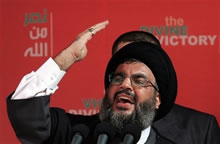Hezbollah's New Mission The "resistance" takes aim at the Lebanese government

Hezbollah's New Mission The "resistance" takes aim at the Lebanese government.
by David Schenker Washington Institute for Near East Policy
09/29/2006 1:46:00 PM
HEZBOLLAH LEADER Hassan Nasrallah made headlines two weeks ago when he claimed during a rally that Hezbollah still possessed 20,000 rockets and missiles after this past summer's war with Israel. The rally and the announcement were audacious: Some 350,000 supporters gathered in South Beirut to see Nasrallah appear publicly for the first time in nearly two months, mocking Israel and demonstrating Hezbollah's steadfastness. Overshadowed amid all this were some pronouncements in Nasrallah's speech that have important implications for U.S. interests and for the future of Lebanon.
In a striking departure from Hezbollah's standard articulation of its raison d'etre as "resistance"--i.e., defending Lebanon from Israel, liberating Sheba farms, and freeing Lebanese prisoners in Israeli jails--Nasrallah added a new domestic orientation to the group's agenda. He linked Hezbollah's disarmament to the formation of a "strong, capable, just, and clean" Lebanese state.
Not coincidentally, according to Nasrallah, the first step in building this new Lebanese state is the establishment of a "serious national unity government"--Hezbollah shorthand for adding more pro-Syrian and anti-Western forces to the government. Were this to occur, it would almost certainly signal the demise of the moderate government of Prime Minister Fouad Siniora and provide the Syrians with a new lease on life in Lebanon.
Given the endemic government corruption in Lebanon, this call for clean government provides yet another pretext for Hezbollah indefinitely to retain its weapons. For Hezbollah, of course, the topic of disarmament has always been a moving target. Initially, in the 1980s, disarmament was contingent on Israeli withdrawal from Lebanon. After the U.N. certified Israel's withdrawal in 2000, the focus became Israeli withdrawal from Sheba farms; later it was the liberation of seven Shiite villages in Northern Israel.
What is surprising is not the addition of yet another rationale for the militia to retain its arsenal but Hezbollah's unexpected turn inward. In his speech, Nasrallah explicitly threatened the United Nations Interim Force in Lebanon (UNIFIL)--the reinvigorated international peacekeeping force currently on the ground in the South--if it attempted to get involved in Lebanese domestic affairs. "Your clear mission," he said, is to "support the Lebanese army. . . . [It] is not to spy on Hezbollah or disarm the Resistance." To avoid being dragged into a "collision" with his militia, Nasrallah warned, UNIFIL must not look into Hezbollah's weapons. "They should not interfere in Lebanon's internal affairs or be involved in such things."
Nasrallah also devoted a portion of his speech to sectarian issues in Lebanon. Though most analysts believe the Israel-Hezbollah war aggravated existing Sunni-Shia tensions, Nasrallah denied there was any such friction, maintaining that "the dispute here is not sectarian, but political." He went one step further, making the astonishing boast that Hezbollah had "protected Lebanon from civil war."
Capping off his foray into local politics, Nasrallah commented that the Siniora government was not up to the task of reconstruction, and he issued a direct challenge to the Lebanese government. If the state fails to protect Lebanon, he said, Hezbollah will again assume the responsibility. "We have thus far been patient . . . be assured that we will not be patient for long."
While the speech was obviously well received by Nasrallah's constituents, others in Lebanon were less than pleased. Druze leader Walid Jumblatt was the most outspoken critic; he described the speech as "a coup." Outside of Lebanon, though, the details of this revolutionary speech went unnoticed, overshadowed by the stunning photos and the rocket announcement.
Nasrallah's speech was important not only for the details but also as an indicator of Hezbollah's postwar strategy. With the deployments of the Lebanese Armed Forces and the reconstituted UNIFIL in the South, Hezbollah's freedom of military action is greatly constrained. Nasrallah's focus on domestic Lebanese politics is tacit recognition of the new reality on the ground. Absent the ability to attack Israel directly, for the time being at least, the "resistance" is in search of a new mission. Nasrallah seems to be working to establish a new political reality to accommodate this requirement.
For the United States and the Siniora government, this development is troubling, and it will be increasingly difficult to contain. In the short term, the best counter to Hezbollah's gambit will be for the Siniora government to succeed in its efforts to reconstruct Lebanon quickly, efficiently, and without conspicuous corruption. In the long term, however, the only real remedy will be to reform the Lebanese political system so that alternative Shiite parties can emerge to challenge--and ultimately dilute--Hezbollah's political power. Until then, Prime Minister Siniora, with U.S. help, will have to settle for competing with Hezbollah--and its Iranian patron--in hometown politics.
David Schenker is a senior fellow at the Washington Institute for Near East Policy. From 2002 to 2006, he was the Syria, Lebanon, Jordan, and Palestinian affairs adviser in the office of the Secretary of Defense.
2006, News Corporation, Weekly Standard.